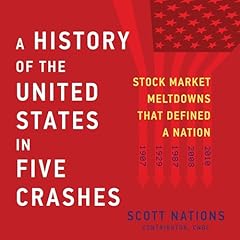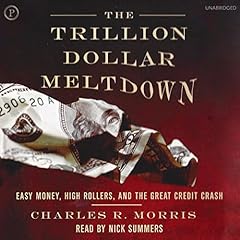
The Sages
Warren Buffett, George Soros, Paul Volcker, and the Maelstrom of Markets
No se pudo agregar al carrito
Add to Cart failed.
Error al Agregar a Lista de Deseos.
Error al eliminar de la lista de deseos.
Error al añadir a tu biblioteca
Error al seguir el podcast
Error al dejar de seguir el podcast
 Exclusivo para miembros Prime: ¿Nuevo en Audible? Obtén 2 audiolibros gratis con tu prueba.
Exclusivo para miembros Prime: ¿Nuevo en Audible? Obtén 2 audiolibros gratis con tu prueba.Compra ahora por $15.90
-
Narrado por:
-
Sean Runnette
-
De:
-
Charles Morris
Throughout the violent financial disruptions of the past several years, three men have stood out as beacons of judgment and wisdom: Warren Buffett, George Soros, and Paul Volcker. Though their experiences and styles vary - Buffett is the canny stock-market investor, Soros the reader of shifting global tides in trade and currencies, Volcker the regulator and governor, sheriff and clean-up crew - they have very much in common.
All three men have more than 50 years of deepinvolvement in markets. All are skeptical of Wall Street frenzies. They believe that markets tend to be right, but usually only over the medium term. Today, all three are key economic advisors to President Obama.
With the benefit of his own deep understanding of markets and finance, Morris brilliantly analyzes the records of these men, distils their wisdom and experience, and argues for the importance of consistent values in navigating the treacherous terrain of today's globalized world.
©2009 Charles Morris (P)2009 HighBridge CompanyLos oyentes también disfrutaron:




















Reseñas de la Crítica
Las personas que vieron esto también vieron:



The book then concludes with a discussion of economics and the role economists play in public policy... this is where the author falls short. While his central thesis is valid (economics, like any discipline that attempts to measure or predict the human mind or behavior, should not rely upon mathematical models... such models are inherently flawed), he mis-characterizes the ideas of Keynes. Mr. Keynes, while being an accomplished mathematician himself, would argue against reliance on precise mathematical models in the application of economic policy. Keynes argued that government stimulus of aggregate demand could be done (tax cuts and spending increases... incidentally, not only the policies that got America out of the Great Depression, but also used to spur and create the 'Age of Prosperity' in the post WW2 to the early 1970s, and forming much of the cornerstone of the economic policies of Ronald Reagan, who also cut taxes and increased spending)... but then when the economy is growing, we should raise taxes back and cut bac on government spending to pay back the accumulated national debt and help bring down aggregate demand to reduce inflationary pressure. This two step approach was not often done... as our government is far quicker to do the tax cuts and increased spending, and slow to raise taxes and cut spending (it was done under the Clinton Administration to great effect).
The unfair presentation of Keynes aside (blaming him for policies that were merely claimed by politicians to be "Keynesian" but in fact were only one half of the prescription), this is an excellent book for its coverage of these three greats.
Excellent story of three of the greats
Se ha producido un error. Vuelve a intentarlo dentro de unos minutos.
Economic Heroes
Se ha producido un error. Vuelve a intentarlo dentro de unos minutos.
Nothing new under the sun
Se ha producido un error. Vuelve a intentarlo dentro de unos minutos.


